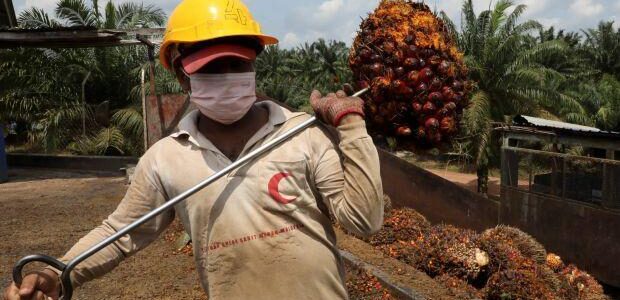
Besides being a key ingredient for cooking jollof rice, vegetable oil is used industrially in paints, soaps, biofuels, and lubricants. But getting the oil from palm nuts can be a hassle for manufacturers if they have to engage smallholder farmers directly. In most cases, the Nigerian farmer cracks palm nuts with large stones, an inefficient process that makes eventual finished goods more expensive.
Nigeria-based startup Releaf intends to solve this problem by processing produce from farmers, and also delivering the oil to food manufacturers.

The startup has raised $2.7 million from a number of investors including Samurai Incubate, a Japanese venture capital firm, and Nigeria-based firms Future Africa, and Consonance Investment Managers. Stephen Pagliuca, chairman of Bain Capital, and Twitch co-founder Justin Kan are also on board.
Releaf also won a $1.5 million grant from the Challenge Fund for Youth Employment (CFYE), a program by the Dutch ministry of foreign affairs, and the United States Agency for International Development.

Why is it difficult to turn palm nuts into processed oil?
“A big challenge in the food processing industry in Africa today is that factories are too far from farmers,” Ikenna Nzewi, CEO and co-founder of Releaf, tells Quartz. “A lot of the money a farmer should receive for crops ends up being eaten up by logistics costs.”
Releaf’s operation begins after farmers harvest palm fruits from trees and remove the flesh for red oil. The company buys nuts from about 2,000 farmers, and crushes the kernel to produce vegetable oil at its factory in Uyo, a town in southern Nigeria.
Nzewi says the factory, which uses proprietary nut de-shelling technology whose patent is pending, cost $150,000 to set up and processes 500 tons of palm nuts per month. The money Releaf has just raised partly went into building and deploying the facility.We’re working with the world’s most efficient crop at producing vegetable oil in a market that is starving for vegetable oil. It’s a domestic market for the taking.
The big picture is to put a factory closer to smallholder farmers who produce 80% of Nigeria’s oil palm. Most production happens in the Niger Delta (42%), southwest (27%), and southeast (25%) regions, according to the US Department of Agriculture (USDA). “We believe the firm’s thesis on decentralizing food processing would have a strong match with Africa’s economic development landscape for the next few decades,” says Rena Yoneyama, managing partner at Samurai Incubate Africa.
Releaf is targeting a gap in supply
A major motivation for Releaf is that Nigeria barely produces enough oil palm to meet local demand.
Current USDA data show Nigeria produces 1.4 million metric tons, but at least 1.34 million of that is consumed within the country. Refined vegetable oils and fat are on Nigeria’s list of prohibited imports, ostensibly to aid local production. “We’re working with the world’s most efficient crop at producing vegetable oil in a market that is starving for vegetable oil. It’s a domestic market for the taking,” Nzewi says.

But taking this market will not be easy. Nigeria’s major oil palm processing companies, mainly Okomu and Presco, have a far larger asset base of plantations and factories, capital, and market connections with consumer goods companies. Releaf will need partnerships to get a foothold in the industry, which is why they have got help from investors who promise connections.
Endeavor Nigeria inducts startups on a fast-growing path into a global network that helps such companies grow even faster. This month, it chose Releaf and three other startups for a 10-week program to “provide them with access to mentorship, capital, partnerships and a strong peer network of high impact entrepreneurs who have scaled their businesses,” says Tosin Faniro-Dada, managing director and CEO of Endeavor Nigeria.
Bundling other services is part of the plan
Releaf is a food processing company at heart. It has similar needs—electricity, talent, equipment—as a large-scale corn, rice, or cassava-processing company.
But in competing with incumbents in the oil palm industry, Releaf hopes its advantage will be direct relationships with farmers. Offering them better technology for harvesting palm heads and extracting fruits, and services like insurance is part of the long-term plan. “We’re using our position with food processing as a wedge to become a trusted member of rural economies,” Nzewi says.
A former private equity consultant at Bain, Nzewi is of Nigerian origin, but was born and raised in the US. He first visited Nigeria in 2015 was intrigued by research activities at the International Institute for Tropical Agriculture. Releaf started as a marketplace for agriculture commodities, but that didn’t look sustainable in a sector with low margins. The company switched to taking an active role in the oil palm value chain in 2017, bringing the 26 year-old closer to a family goal.
“My grandfather actually had a vision to start a big oil palm plantation. My mum feels like I am fulfilling his ambition,” he says.
Credit: Yahoo News
